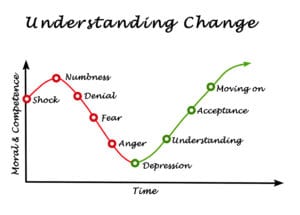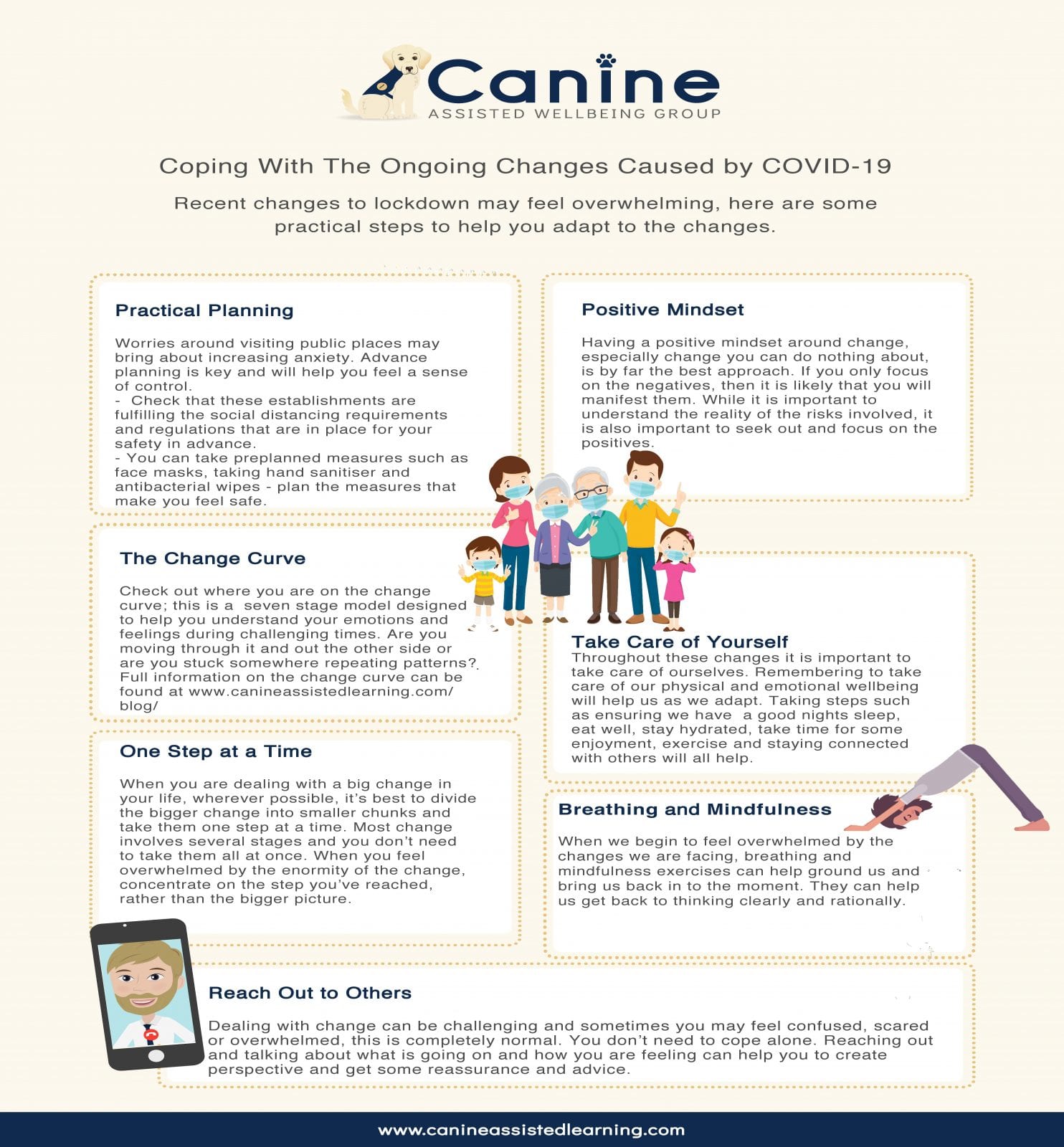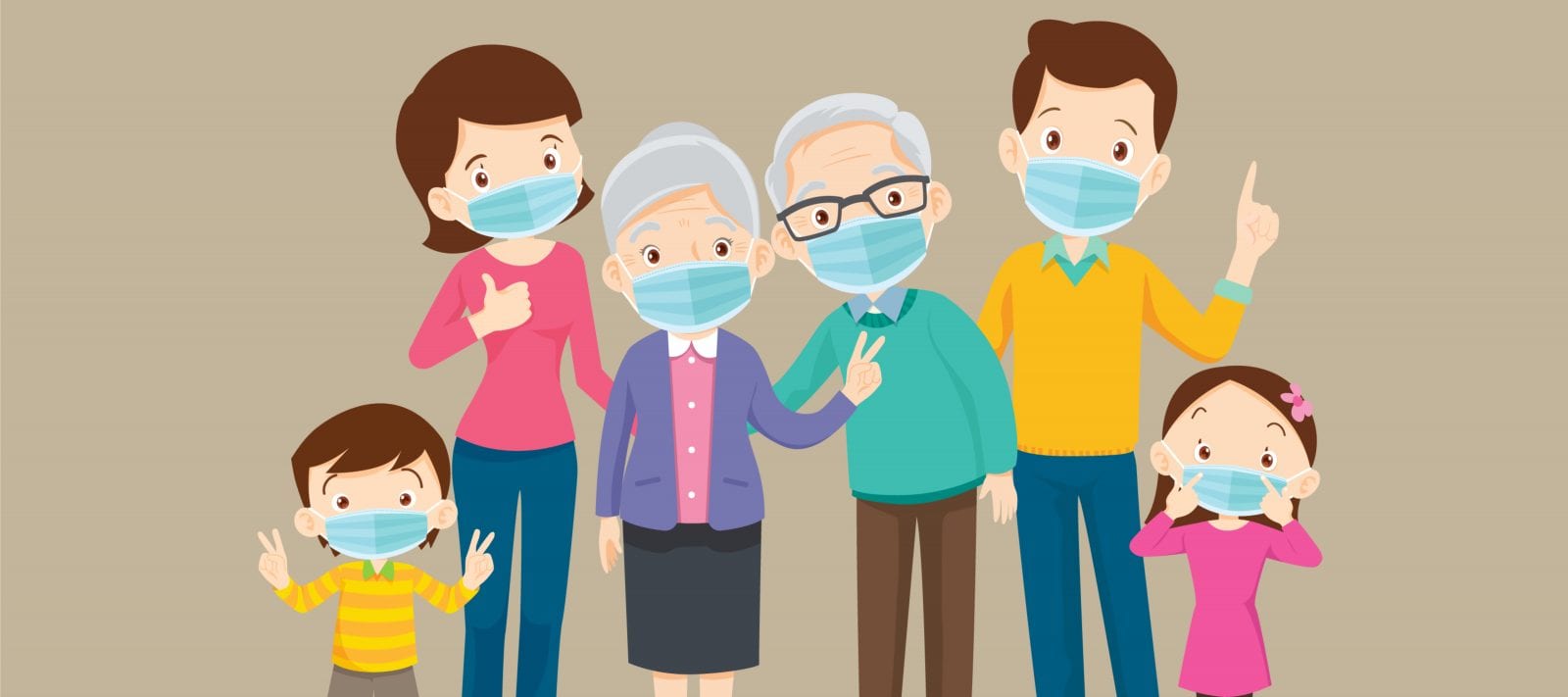How do we feel about the recent changes to lockdown? This is a huge question and has sparked much debate. As always, we will all have differing feelings and coping mechanisms – and that is ok. We each need to adapt to the changes in our own way and it is likely to be uncomfortable for most of us as we find a way forward to a new normal.
We have already coped with huge changes to the way we live and may still be grieving for those changes and now here come more. Ironically we may have developed a sense of safety during lockdown, finding our homes ‘a safe haven’ and now we are able to step outside of that haven, it may feel worrying.
Making changes to your life and daily routine is not easy, so don’t expect yourself to go out all guns blazing! It was a challenge to make the initial changes and it may feel challenging again. Be kind to yourself and those around you, children and adults alike, who may also find it difficult to get back into old and new routines. Remember that we will not ALL be able to adjust in the same way.
As human beings we are fairly resilient and for most of us the anxiety we first feel will pass. So whether you already lived with an anxiety disorder, or it has developed as a result of the pandemic, remember there are things you can do to help you cope and make the adjustments as ‘rules’ are changed step by step.
What are you worried about and what can you do –
- Stepping outside – try not to overthink this. You have probably done this before, day after day – try and remember what was normal for you. How are you safe guarding yourself and your children? Face masks, understanding of the continued need for good hand washing, wearing gloves, distancing etc. Thinking about safety measures in this way will give you a sense of control over the situation.
- Public transport – many will need to use public transport to get to school and the workplace and this may understandably feel quite daunting. Again safeguarding yourself can give you comfort and a sense of some control. I’ve taken to carrying a pack of Antibacterial wipes with me.
- Schools\workplace – worries around public places may be an issue for some. You can check that these establishments are fulfilling the social distancing requirements and regulations that are in place for your safety.
- Increased fear for you and your families health – Dr Taylor is the author of The Psychology of Pandemic. He suggests that it is the way our behaviour is driven that is most important. ”It’s not just some bug that’s going at random around the world. It’s people’s behaviour that determines whether or not a virus will spread.”
- Check out where you are on the change curve. Are you moving through it and out the other side or are you stuck somewhere repeating patterns?
- KEEP IT SIMPLE – SAFEGUARD YOURSELF AND YOUR FAMILY
The Change Curve
Understanding some of the emotions and feelings we are tackling can be a helpful step to adapting to the changes we are facing – this is where the change curve can help. It is a psychological model that predicts the way we adapt to a huge change in our lives. Originally devised by the psychiatrist Elisabeth Kubler-Ross, it helps describe different stages of grief. It is often used to help understand how people feel during organisational changes and any major upheaval in life, which is very relevant to our current situation. The curve has seven stages – shock, denial, anger and blame, bargaining and self-blame, depression and confusion, acceptance and problem solving.

These stages enable us to acknowledge the feelings we may be having and to be reassured that time will move us on – that we will adapt.
The Stages:
Shock
This begins when a change is first introduced, where people’s initial reaction may be shock or denial. .
Denial
Denial is often experienced as feelings such as “this isn’t real”or “this isn’t happening to me”. People are often unable to accept the situation that is facing them – it is a defence mechanism that many of us use in order to cope with difficult situations. This is a stage we can become stuck in for long periods of time, often moving between shock and denial.
Anger or frustration
These feelings show we are starting to come to terms with the situation we are faced with and are starting to move on from the denial stage. We often seek to blame somebody else for the situation we are in, such as the government or the people who you deem not to be following government guidelines. These strong feelings can bring about feelings of anger and loss of control.
Bargaining and self-blame
When the stage of anger passes away, we may start thinking about ways to postpone the inevitable and try to focus on making the best of the situation. Bargaining is a more constructive stage and can be the turning point. During this stage, people start to gain some perspective and consider the wider implications.
Depression or despair
Depression is a stage in which we tend to feel sadness, fear, regret, guilt and other negative emotions. We may have completely given up by now and may reach a dead end from where the road only seems dark. This may seem like a lowest point in life with no way ahead.
Acceptance
Acceptance is when we start to let go, and accept the changes we are being faced with. This means exploring what the changes mean for us and how we must adapt. As we start this new reality we can often slide back into doubt.
Problem solving and moving forward
The seventh stage is about growth and learning. We focus here on learning to live and move forward in a new world; to make the adaptations we need to look ahead and thrive in our newly evolving world.
According to Kubler Ross, three types of support can help us through the change curve. They are:
- Information and Communication. When we can access clear information and transparent communications about the changes that we are going through, we’re better able to navigate it.
- Emotional Support. What sources of emotional support are available to you? What habits will serve you in accessing emotional support on a regular basis?
- Guidance and Direction. During times of momentous change, we naturally need to look towards those people in our lives who can help us to clarify our values or make meaning of the events that surround us. Who are those people in your life? Are they people that you know personally that you could connect with? Or are they authors whose books you can read or reread? Or perhaps it’s a meditation or religious practice that helps you put things in perspective.
Adjusting to life after lockdown
A new phenomenon appears to be emerging in the world of mental health around anxiety post lockdown.
While people have been living under the most stringent measures and abiding by the ‘rules’, there are now many who are fearful about what will happen as these are lifted. “The good news is people are resilient,” says Dr Taylor. “I expect that most of the people who are anxious right now will recover in the coming weeks, perhaps months, after lockdown restrictions have been lifted.
“That said, some people will have lingering psychological problems.”
Akanksha has already started thinking about how she will cope when lockdown in India lifts.
“Though there are a lot of people looking forward to it, I don’t understand those people,” she says.
Akanksha’s going to do some of the things that experts say are good for our mental health, like eating well and doing regular exercise. “Keep it as simple as you can,” she adds, “and don’t overwhelm yourself with anything new suddenly. I won’t be going crazy with parties every day.”
But she will continue with a hobby that she started during lockdown, to maintain her routine as the world around her changes yet again, which gives her an ongoing sense of achievement.
“I’m learning Korean right now,” she says. “I want to watch my K-dramas without subtitles.”
Try not to overwhelm yourself with making too many changes all at once. Give yourself time to adjust and adapt your routine, starting with the key changes that affect you the most. E.g. you may need to physically return to work or start thinking about your child returning to school next month. Talk to your employer about your anxieties and see if you can begin with a phased approach to allow you to travel on a limited number of days or non-peak hours. Plan your safety and wellbeing for your journey and duration of time at work. Start talking to your children about how the changes will affect their return to school so you can all get used to the idea. Regular conversation can help the new changes begin to feel less daunting.
Focus on some of the other changes once you have a handle and feel more comfortable with your priorities. Remember, most people will be feeling anxious about the changes and moving forward. You are not alone with your concerns and it’s perfectly fine – and perhaps essential – to act with caution. 

